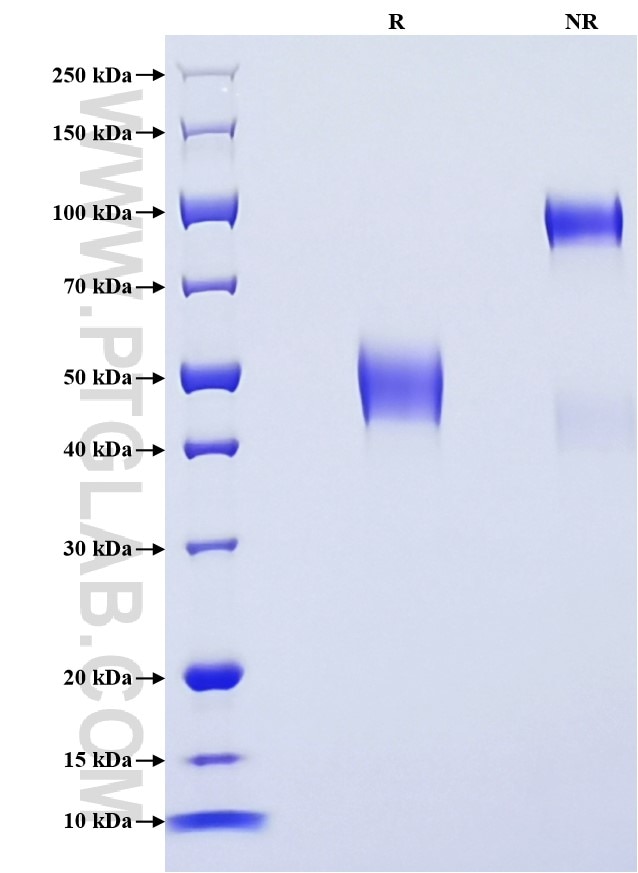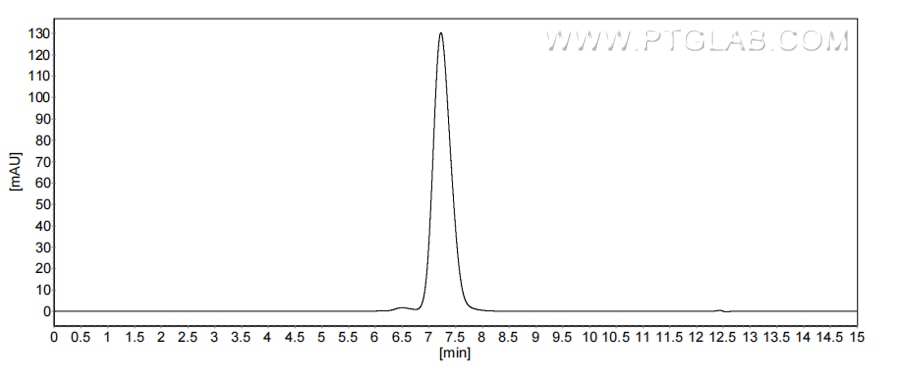Recombinant Human CD63 protein (rFc Tag)(HPLC verified)
Species
Human
Purity
>90 %, SDS-PAGE
>90%, SEC-HPLC
Tag
rFc Tag
Activity
not tested
Cat no : Eg2064
Validation Data Gallery
Product Information
| Purity | >90 %, SDS-PAGE >90%, SEC-HPLC |
| Endotoxin | <0.1 EU/μg protein, LAL method |
| Activity |
Not tested |
| Expression | HEK293-derived Human CD63 protein Ala103-Val203 (Accession# P08962-1) with a rabbit IgG Fc tag at the C-terminus. |
| GeneID | 967 |
| Accession | P08962-1 |
| PredictedSize | 37.8 kDa |
| SDS-PAGE | 42-58 kDa, reducing (R) conditions |
| Formulation | Lyophilized from 0.22 μm filtered solution in PBS, pH 7.4. Normally 5% trehalose and 5% mannitol are added as protectants before lyophilization. |
| Reconstitution | Briefly centrifuge the tube before opening. Reconstitute at 0.1-0.5 mg/mL in sterile water. |
| Storage Conditions |
It is recommended that the protein be aliquoted for optimal storage. Avoid repeated freeze-thaw cycles.
|
| Shipping | The product is shipped at ambient temperature. Upon receipt, store it immediately at the recommended temperature. |
Background
CD63 is a 30-60 kDa lysosomal membrane protein that belongs to the tetraspanin family. This protein plays many important roles in immuno-physiological functions. It mediates signal transduction events that play a role in the regulation of cell development, activation, growth, and motility. CD63 is expressed on activated platelets, thus it may function as a blood platelet activation marker. CD63 is a lysosomal membrane glycoprotein that is translocated to plasma membrane after platelet activation. The CD63 tetraspanin is highly expressed in the early stages of melanoma and decreases in advanced lesions, suggesting it as a possible suppressor of tumor progression. Deficiency of this protein is associated with Hermansky-Pudlak syndrome.
References:
1. Ki-Kyung Jung, et al. (2006) EMBO J. Sep 6;25(17):3934-42. 2. Guillaume van Niel, et al. (2011) Dev Cell. Oct 18;21(4):708-21. 3. Maaike S Pols, Judith Klumperman. (2009) Exp Cell Res. May 15;315(9):1584-92. 4. D O Azorsa, et al. (1991) Blood. Jul 15;78(2):280-4. 5. M Nishibori, et al. (1993) J Clin Invest. Apr;91(4):1775-82.Maaike S Pols 1, Judith Klumperman


